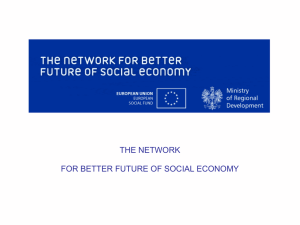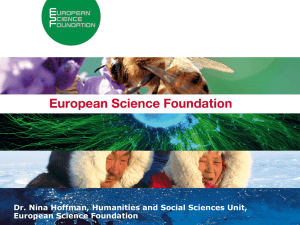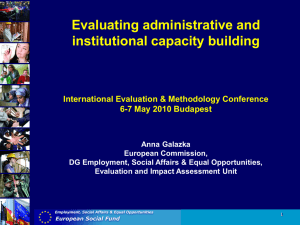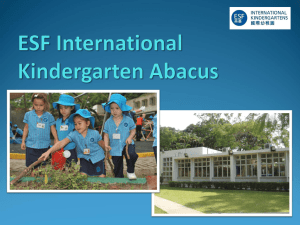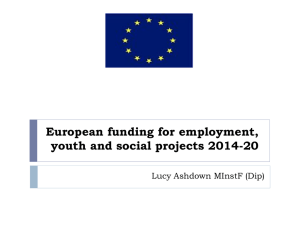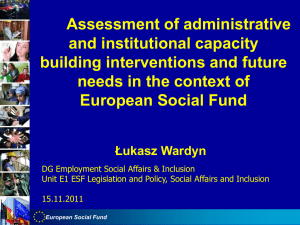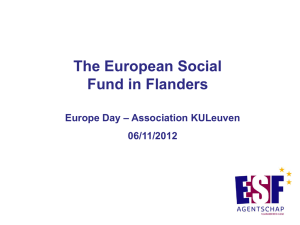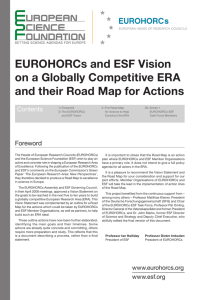Bild 1 - EuroCRIS
advertisement
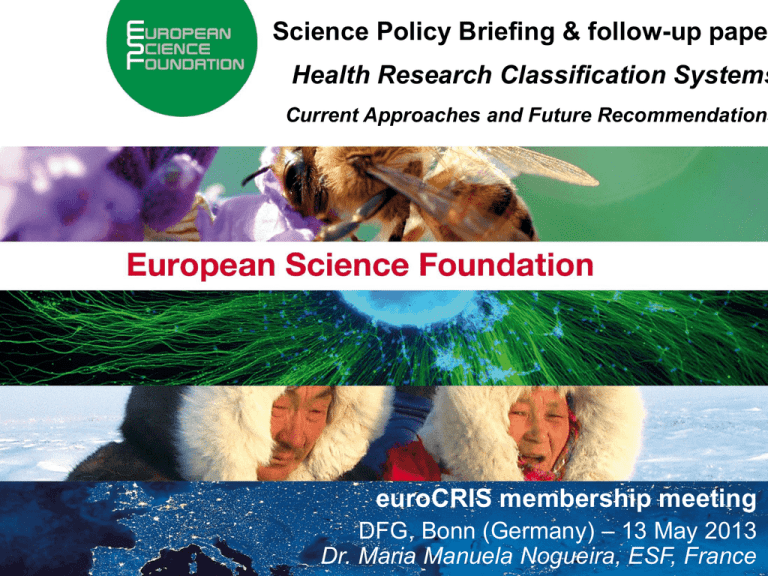
Science Policy Briefing & follow-up pape Health Research Classification Systems Current Approaches and Future Recommendations euroCRIS membership meeting 1 DFG, Bonn (Germany) – 13 May 2013 Dr. Maria Manuela Nogueira, ESF, France About the European Science Foundation Science Policy Briefing (SPB) Expert Group Chair: Ian Viney (Medical Research Council, UK)* Expert group: Liz Allen* and Kevin Dolby (Wellcome Trust, UK) Margaret v. Ames (National Cancer Institute, USA) * These experts also participated to the ESF MO Rafael de Andrés Medina* (ISCiii, ES) Forum on Evaluation of Publicly Funded Research Edvard Beem and Erica Hackenitz (ZonMw, NL) Gérard Bréart (AERES, FR) Linda Butler (The Australian National University, Australia) Kristina Casey and Leah Jurkovic (Canadian Institutes of Health Research, Canada) Brendan Curran* (Health Research Board, IE) Katharina Fuss* and Jürgen Güdler* (DFG, DE) Iveta Hermanovská* (Slovak Academy of Sciences, SK) Marcus Nicol (National & Health Medical Research Council, Australia) Elmar Nimmesgern (European Commission, Health Research, DG Research and Innovation) Giovanni Pacini (CNR, IT) Ingrid Roxrud* (Research Council of Norway, NO) Frédéric Sgard (OECD) Beverley Sherbon* (Medical Research Council, UK) Josef Syka (Czech Science Foundation GACR, CZ) Gyula Péter Szigeti* (OTKA, HU) Robert F. Terry (WHO) Mats Ulfendahl (Swedish Research Council, SE) Additional contributors: Pilar Pérez (EMRC permanent observer, LESC Core Group member, University of Salamanca, ES); Nigel L. Brown (LESC Core Group member, University of Edinburgh, UK); Jan Tavernier (LESC Standing Committee member, University of Gent, BE) 2 SPB recommendations Recommendation 1 Use of the HRCS is encouraged as the leading approach for comparison and joint analysis of specifically health research portfolio information. Recommendation 2 Methodological developments are needed to reduce the cost of classification and increase flexibility. Recommendation 3 Coordination of a common approach is needed across organisations, at the national, European and international level. 3 SPB conclusions Conclusion 1 Recognition of the strategic advantage that would be gained from being able to analyse medical research portfolios across Europe. Conclusion 2 The use of a standard international classification system for health research is encouraged. It may be implemented in parallel to individual classification systems. 4 Organisations’ support 23 ESF Member Organisations (MOs) + 2 non-MOs • Lietuvos Mokslo Taryba (LMT) • Fonds de la Recherche Scientifique (FNRS) Research Council of Lithuania, Lithuania Fund for Scientific Research, Belgium • Norges Forskningsråd • Fonds voor Wetenschappelijk Onderzoek (FWO) The Research Council of Norway (RCN), Norway Research Foundation Flanders, Belgium • Polska Akademia Nauk (PAN) • Hrvatska akademija znanosti i umjetnosti (HAZU) Polish Academy of Sciences, Poland Croatian Academy of Sciences and Arts, Croatia • Fundação para a Ciência e a Tecnologia (FCT) • Hrvatska zaklada za znanost (HRZZ) Foundation for Science and Technology, Portugal Croatian Science Foundation, Croatia • Slovenská akadémia vied (SAV) • Grantová agentura České republiky (GAČR) Slovak Academy of Sciences, Slovak Republic Czech Science Foundation, Czech Republic • Consejo Superior de Investigaciones Científicas (CSIC) • Det Frie Forskningsråd - Sundhed og Sygdom (FSS) Council for Scientific Research, Spain The Danish Council for Independent Research - Medical Sciences, • Ministerio de Ciencia e Innovación (MICINN) Denmark Ministry of Science and Innovation, Spain • Suomen Akatemia/Finlands Akademi • Vetenskapsrådet (VR) Academy of Finland, Finland Swedish Research Council, Sweden • Deutsche Forschungsgemeinschaft (DFG) • Türkiye Bilimsel ve Teknolojik Arastırma Kurumu (TÜBITAK) German Research Foundation, Germany The Scientific and Technological Research Council of Turkey, • EONIKO IΔPYMA EPEYNΩN Turkey National Hellenic Research Foundation (NHRF), Greece • Medical Research Council (MRC), United Kingdom • Ίδρυμα Τεχνολογίας και Έρευνας (FORTH) Foundation for Research and Technology – Hellas (FORTH), Greece • Országos Tudományos Kutatási Alapprogramok (OTKA) Additional supportive organisations: Hungarian Scientific Research Fund, Hungary • Ministarstvo Znanosti, Obrazovanja I Športa Republike • Health Research Board (HRB), Ireland Hrvatske, Ministry of Sciences, Education and Sports, Croatia • Consiglio Nazionale delle Ricerche (CNR) • Zorg Onderzoek Nederland en Medische Wetenschappen National Research Council, Italy (ZonMw), The Netherlands Organisation for Health Research and Development, The Netherlands http://www.esf.org/hrcs 5 Follow-up paper May 2012 • Implementation of the 3 recommendations Find realistic and concrete implementation steps • Key stakeholders Ensure implementation and engagement of MOs Identify additional stakeholders for implementation • Develop an action plan with milestones and timeline 6 Follow-up with the MOs summer-autumn 2012 • Organisations who are already using the UK HRCS: Swedish Research Council, Research Council of Norway, Health Research Board Ireland • Organisations who have run or are ready to run a pilot: Test the UK HRCS in parallel to their own system • Organisations who will not implement the UK HRCS: Other classification systems in use, lack of human resources, inter-disciplinarity missing, etc. • Need for European coordination: EC, debate at EP, example of ICRP, MO Forum and SPB experts (HRCS update) 7 Thank you for your attention! Dr. Maria Manuela Nogueira Senior Science Officer, Biomedical Sciences European Science Foundation (ESF) 1 quai Lezay-Marnésia - BP 90015 67080 Strasbourg cedex – France Tel +33 (0)3 88 76 71 45 mnogueira@esf.org www.esf.org/hrcs 8
